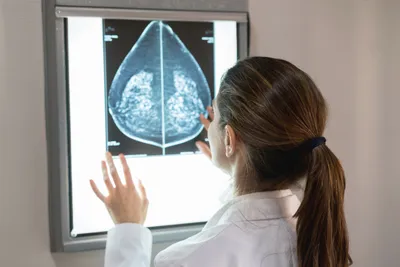Health
Rising Breast Cancer Rates in Haryana Prompt Health Experts’ Call for Early Detection

The increasing incidence of breast cancer in Haryana and other regions of India has raised significant alarm among medical experts and health administrators. Official data reveals that one in 28 women in urban areas and one in 40 in rural areas are diagnosed with breast cancer. Alarmingly, studies indicate that the incidence of breast cancer in Haryana is rising at a rate of approximately 11 percent annually, approaching similar trends seen in Delhi.
At the Post Graduate Institute of Medical Sciences (PGIMS) in Rohtak, nearly 600 cases of breast cancer are reported each year through the departments of Surgery and Surgical Oncology. However, only one-third of these cases are identified at early stages when treatment is most effective. “Currently, no vaccine has been developed to prevent breast cancer. Nonetheless, the positive aspect is that early detection significantly improves the chances of a cure,” states Dr. Nityasha, Senior Professor and Unit Head at PGIMS. She emphasizes that if breast cancer is detected in its initial stage, between 95 and 99 percent of cases can be completely treated.
Dr. Nityasha also highlights a concerning trend: previously, breast cancer was primarily seen in women over the age of 50. Now, cases among women in their 40s, 30s, and even 20s are becoming more common. Factors contributing to this shift include sedentary lifestyles, smoking, obesity, and poor dietary choices.
Between 2013 and 2019, approximately 23,600 cases of cancer were registered in Haryana, with 3,132 identified as breast cancer. The number of breast cancer-related deaths rose from 1,572 in 2013 to 1,771 in 2023. During a recent Assembly session, Haryana’s Health Minister Arti Singh Rao informed lawmakers that, due to the absence of population-based cancer registries, there is no comprehensive overview of cancer trends in the state. From 2020 to 2022, approximately 90,000 new cancer cases were detected, resulting in 49,649 mortalities.
This issue was brought to light by Indian National Lok Dal MLA Arjun Chautala, who highlighted the rising number of cancer patients in Haryana. While breast cancer predominantly affects women, men are also at risk. Health experts recommend that women in their 20s perform regular self-examinations, while those in their 30s should seek clinical evaluations from medical specialists. Women in their 40s are advised to undergo mammography screenings.
The approach to treating breast cancer has evolved, with a growing preference for breast conservation surgery over mastectomy to support patients’ emotional well-being post-surgery. “Patients should consult only specialized surgeons and avoid non-professionals,” cautioned a doctor from PGIMS.
Dr. Sanjeev Prasad, Head of the Department of Cancer Surgery at PGIMS, reiterated the importance of early detection, stating, “Cancer is a daunting disease, but early detection can lead to complete recovery. Instead of waiting for symptoms, everyone should proactively seek screenings.”
October is recognized globally as Breast Cancer Awareness Month, often referred to as Pink October. Dr. Suhas Kirti Singla, an oncologist, noted the significance of this month in promoting awareness and encouraging preventive measures. Awareness and early intervention remain crucial in combating the rising trend of breast cancer cases, particularly among younger women in Haryana and across India.
-

 World5 months ago
World5 months agoSBI Announces QIP Floor Price at ₹811.05 Per Share
-

 Lifestyle5 months ago
Lifestyle5 months agoCept Unveils ₹3.1 Crore Urban Mobility Plan for Sustainable Growth
-

 Science4 months ago
Science4 months agoNew Blood Group Discovered in South Indian Woman at Rotary Centre
-

 World5 months ago
World5 months agoTorrential Rains Cause Flash Flooding in New York and New Jersey
-

 Top Stories5 months ago
Top Stories5 months agoKonkani Cultural Organisation to Host Pearl Jubilee in Abu Dhabi
-

 Sports4 months ago
Sports4 months agoBroad Advocates for Bowling Change Ahead of Final Test Against India
-

 Science5 months ago
Science5 months agoNothing Headphone 1 Review: A Bold Contender in Audio Design
-

 Top Stories5 months ago
Top Stories5 months agoAir India Crash Investigation Highlights Boeing Fuel Switch Concerns
-

 Business5 months ago
Business5 months agoIndian Stock Market Rebounds: Sensex and Nifty Rise After Four-Day Decline
-

 Sports4 months ago
Sports4 months agoCristian Totti Retires at 19: Pressure of Fame Takes Toll
-

 Politics5 months ago
Politics5 months agoAbandoned Doberman Finds New Home After Journey to Prague
-

 Top Stories5 months ago
Top Stories5 months agoPatna Bank Manager Abhishek Varun Found Dead in Well









